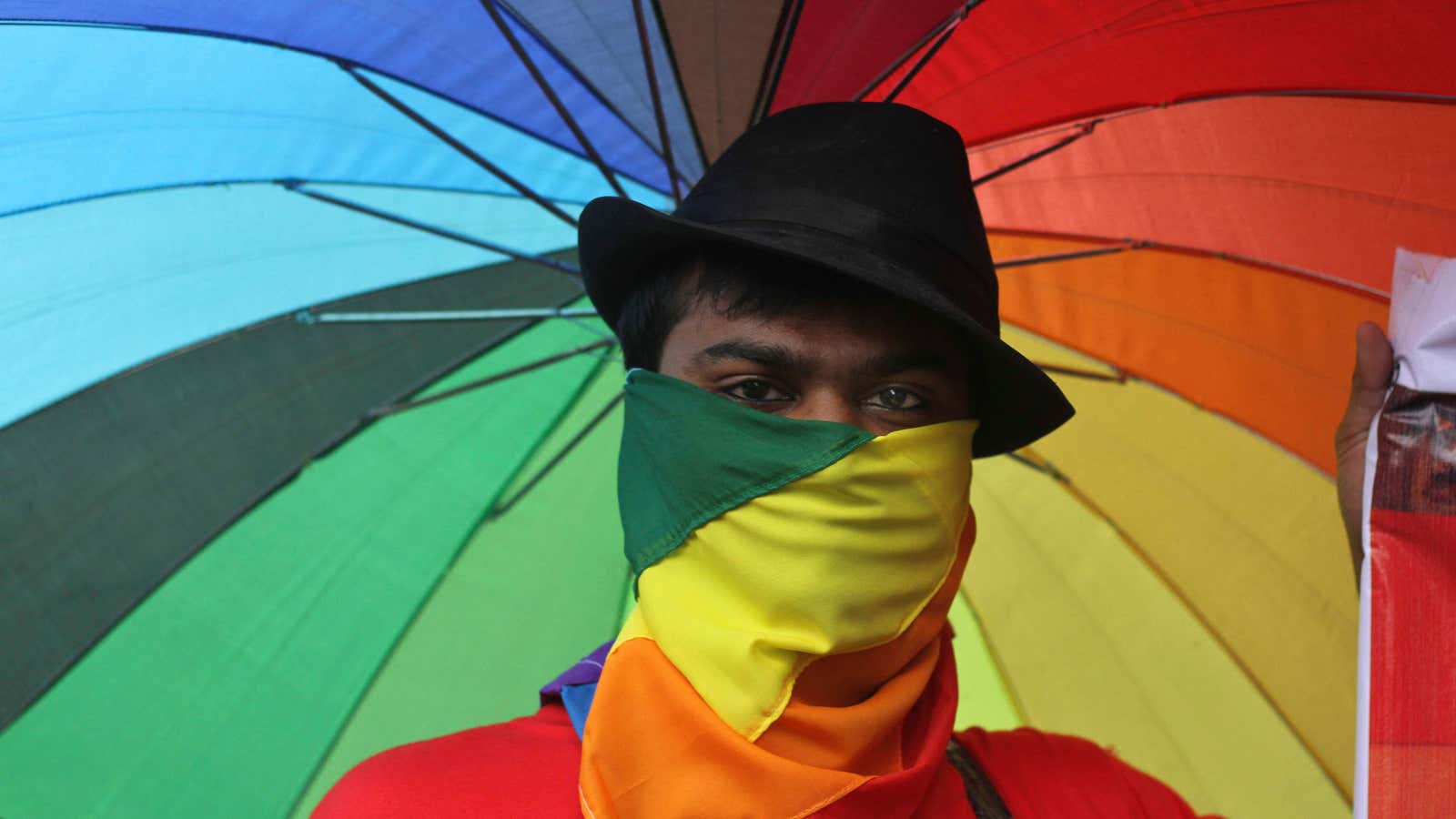Growing up, Divya Roop already knew he was attracted to his own gender but he didn’t want to come out until he became independent. Then, his sister found his alternate Facebook profile and outed him to his family. His father suggested yoga as a cure for homosexuality while his mother rued, “I gave birth to a son, not a hijra (a south Asian pejorative for transgenders).”
Eventually, Roop moved out to keep his family “away from those difficult questions they didn’t want to face before the society,” he told Quartz. The 25-year-old customer-care advisor, who identifies as an androgynous homosexual, now wears a face full of make-up and dons high heels, is a vocal LGBTQ (lesbian, gay, bisexual, transsexual, queer) activist, and part of India’s first gay choir group, Rainbow Voices.
But the struggle is still far from over.
For a society that makes the LGBTQ community feel like criminals with its rigid cultural norms and archaic laws, searching for a same-sex partner can be a nightmare. “People are expected to be straight in front of the society, which means you will not find an out and proud person from the community so easily,” Roop said. Meeting someone through friends or at a restaurant is often out of the question.
So, for India’s scatted LGBTQ community, the best bet to find like-minded people is the internet. Dating apps cast a wide net and help find exactly the kind of people you want to be with.
But then, there’s an ugly side to that, too. For instance, anonymity often allows imposters to con genuine users. Besides, identities are often outed unwittingly, which can have catastrophic consequences for those who prefer discretion.
Finding love online
With internet and smartphone penetration on the rise in India, the LGBTQ community is increasingly taking to online dating sites to mingle. Already, around 1.4% or 69,000 of the five million users of US gay dating app Grindr and nearly 3% or 92,000 users of German app Planet Romeo’s three million users are in India.
But setting up your dating profile can often be like placing a target on your own back.
“With life becoming easier, it has become riskier as well,” Roop said. “There are so many times that people use someone else’s pictures as their own to attract guys and then they call these guys over and blackmail them for money.”
In July 2015, a gay maritime engineer was reportedly lured into a trap through an online dating service. He was attacked and extorted by two men while he was in a hotel room in Mumbai with a man he had met on a dating app. The attackers stole his possessions and emptied his bank account, and threatened to press criminal charges for having sex with a man if he went to the police.
This “catfishing” phenomenon is becoming more prevalent, according to Sonal Giani, advocacy manager at India’s oldest LGBTQ organisation, The Humsafar Trust. Online predators “often beat and sexually abuse the victims…but the victims are so scared that they generally don’t tell anyone,” Gaini added.
In addition, identities are not fully secure online. For example, in 2011, news channel TV9 ran a PlanetRomeo “exposé” of people in Hyderabad, publicly identifying profiles of gay men.
However, app-makers say they have put checks and balances such as verifying user identities and limiting app permissions online. Grindr, for instance, now has discreet icons that let users camouflage the app on their phones. But since homosexuality largely remains a taboo in India, it can still be hard to convince someone you meet online to take the next logical step offline. Some new apps are now finding a fix for just that.
Real relationships
Twenty-seven-year-old Ishaan Sethi launched an app called Delta this April. The platform brings together like-minded individuals who can establish any relationship—friends, romantic partners, mentor-mentee—with its “Connect” feature.
Sethi’s idea of building something less flippant than existing dating apps stemmed from conversations with Sachin Bhatia, CEO of dating app TrulyMadly. Sethi’s app not only verifies user identities but also connects people based on compatibility and assigns “trust scores” to users to up their credibility.
“Draconian laws and cultural barriers…have an adverse effect on an individual’s life, sense of dignity and ability to function across multiple arenas—meeting people, dating, finding support, access to jobs, even housing,” co-founder and CEO Sethi, who himself is gay, told Quartz.
In a country with over 2.5 million LGBTQ people, where tens of thousands of them have already created dating profiles, the potential market reach of these apps is substantial. Some organisations are even leverage them to disperse important messages about safe sex and HIV-prevention.
But Roop, a Grindr and Plannet Romeo user, isn’t totally convinced yet.
“…they may have been good for finding someone for a date but they have ended up becoming more of a hookup space,” Roop said. “It’s not a group of people there for each other as a community, but any random horny person trying to have physical intimacy for just a night or two.”
